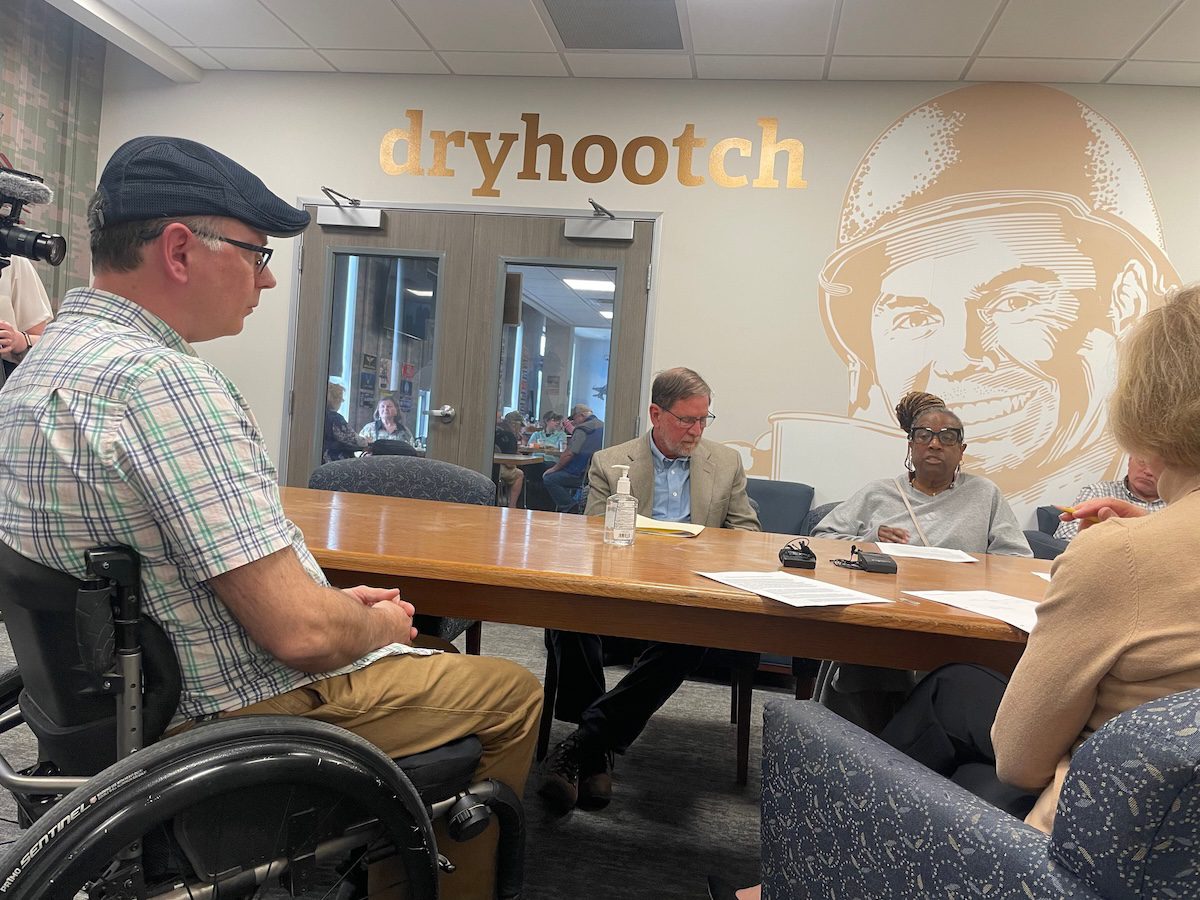
Jussi Reponen, a U.S. Army veteran, uses a wheelchair after losing the ability to walk from his exposure to chemical toxins in the Middle East. Without daily medications and a reliable team of medical specialists at the William S. Middletown Memorial Veterans' Hospital in Dane County, he would not be able to live. He sits opposite U.S. Sen. Tammy Baldwin, and across from Dr. Michael Siebers, a retired VA medical doctor, and U.S. Air Force veteran Carolyn Morgan on May 27 at Dry Hootch in Madison, Wisconsin.
According to a recent report, Wisconsin’s three VA health care systems―William S. Middleton Memorial, VA Tomah Health Care and Clement J. Zablocki Veterans’ Administration Medical Center―were short a combined 51 clinical positions and 21 nonclinical positions.
The last time U.S. Army veteran Jussi Ruponen visited the William S. Middleton Memorial Veterans Hospital in June, he was surprised to see his primary care physician come in to check his vitals.
In his 20 years as a patient at the Dane County-based VA medical center, Ruponen said that task had always been completed by a nurse. When he asked about the change, he said his doctor told him there weren’t enough nurses to do that work regularly anymore.
After a life-altering chemical exposure overseas led to Ruponen losing his ability to walk, regular visits to the veterans’ health clinic every six months are crucial.
“If I don’t see these doctors, they can’t keep good tabs on me and adjust my medication levels to make sure I can be alright,” he said.
At a roundtable for veterans hosted by Sen. Tammy Baldwin earlier this year, Ruponen said he increasingly worries about waning staff, and he’s not the only one.
According to an August report from the Office of Inspector General, the watchdog arm of the Department of Veterans Affairs, all 139 Veterans Health Administration facilities in the country have reported severe occupational shortages, a 50% increase from last year.
According to the report, Wisconsin’s three VA health care systems ― William S. Middleton Memorial, VA Tomah Health Care and Clement J. Zablocki Veterans’ Administration Medical Center ― were short a combined 51 clinical positions and 21 nonclinical positions.
The Middleton and Tomah facilities reported severe shortages of medical officers and nurses. The Tomah and Milwaukee facilities, meanwhile, reported severe shortages of psychiatrists.
The Office of Inspector General audit flagged psychology as the most frequently reported shortage overall.
The report comes after Trump-appointed Secretary of Veterans Affairs Doug Collins vowed in March to slash more than 76,000 jobs under a major restructuring plan, arguing that waste, fraud and abuse encumbered the VA’s ability to serve patients.
By July, the department walked back its need for a large-scale reduction in force. However, the VA has said other employee-reducing measures, such as the federal hiring freeze, deferred resignation program, retirements and attrition diminished staff numbers from January to June by nearly 17,000.
The VA expects an additional 12,000 to vacate their positions by the end of September.
The VA’s watchdog arm conducted its surveys in April, before the lion’s share of job reductions took place.
Since the Office of Inspector General began auditing facilities in 2014, it has identified severe shortages in eight of its 12 annual reports. But 2025 marks the highest number of staffing shortages since 2018.
To conduct these surveys, the office sent questionnaires about vacancies to each of the 139 facilities. The standards for staffing levels are based on federal regulations from the Office of Personnel Management.
Peter Kasperowicz, press secretary for the U.S. Department of Veterans Affairs, dismissed the watchdog office’s findings, calling them “not standardized and unreliable.”
“The report simply lists occupations that facilities feel are difficult for which to recruit and retain, so the results are completely subjective,” Kasperowicz told the Milwaukee Journal Sentinel in an email Aug. 26.
READ MORE: Rural health care faces ‘death spiral’ from GOP Medicaid cuts
Department-wide, he said, the vacancy rates for doctors and nurses are 14% and 10%, respectively. Kasperowicz emphasized those are lower now than under the Biden administration, when vacancy rates were 19% and 20% for doctors and nurses, respectively.
A spokesperson from the Office of Inspector General declined to comment outside of what was outlined in the report.
VA spokesperson says ‘mission-critical’ positions are not being targeted
According to Kasperowicz, the decision to reduce VA staffing levels is a response to the Biden administration’s failure to address “nearly all of its most serious problems, such as benefits backlogs, rising health care wait times and major issues with survivor benefits.”
The VA has said “mission-critical” positions — like doctors, nurses and other front-line workers — are not the target of the voluntary resignations.
Kasperowicz said cutting positions like administrators, advisors and middle manager posts will “eliminate duplicative, unnecessary layers of management and bureaucracy that do nothing to serve our veterans and actually hinder work.”
Of the shortages flagged at the Middleton VA, 25 were clinical staff, including medical officers, nurses, and primary care positions. Eleven were nonclinical, including painters, maintenance mechanics and food service workers.
At Tomah, the report showed a similar breakdown, with nine shortages among clinical staff and five nonclinical.
Zablocki, meanwhile, reported shortages in 16 clinical positions, including internal medicine and psychiatry, and five nonclinical positions.
Dr. Michael Siebers, a physician who served at the William S. Middleton Memorial Veterans Hospital for 27 years, said many clinicians are choosing to leave on their own accord. As of May, Siebers said, more than 1,700 nurses and at least 200 had already departed across the country.
“They’re not firing nurses ― they’re forcing them to retire,” said Siebers, who also spoke at the roundtable hosted by Baldwin.
The upheaval has made the VA hospitals a less-than-appealing place to work, according to Siebers. He said the severe shortages have impacted nonclinical staff like medical technicians and custodians, too.
This creates delays in patient care, from nurses having to run across the campus to fetch IV poles to cardiovascular surgeons having to clean their own offices after each patient, Siebers said.
“Things are changing. When I try to talk to someone who I worked with for 20 years, they won’t answer my phone call,” Siebers said. “They’re afraid.”
Fitzgerald, Baldwin respond to concerns about VA staff shortages
Republican U.S. Rep. Scott Fitzgerald, who is a veteran, told the Journal Sentinel in an emailed statement he will “always make it a top priority to ensure Wisconsin veterans have access to the care they deserve.”
Fitzgerald noted the opening of a outpatient clinic in Oconomowoc last June has expanded access in the community.
Fitzgerald also shared an August press release from the VA showing that more than three-quarters of VA hospitals across the country received top scores for patient care, “a strong reflection of the quality that veterans can and should expect,” he said.
He encouraged any veteran who needs help navigating the VA system to call his district office in Oconomowoc at 262-784-1111 for assistance.
Democratic U.S. Senator Tammy Baldwin, meanwhile, accused the Trump administration of “pulling the rug out from under our veterans.”
“These dedicated folks that serve at the VA are not just leaving out of the blue,” Baldwin told the Journal Sentinel in an emailed statement Aug. 22. “The Trump Administration is driving them out and it means longer wait times, calls going unanswered, and veterans not getting the care they deserve.”
Carolyn Morgan, a second-generation veteran of the U.S. Air Force who spoke at Baldwin’s event, said she was grateful when Congress passed a law in 2022 expanding VA benefits to those exposed to toxic chemicals like Agent Orange.
Her father, who served in the Vietnam and Korean wars, died from kidney failure and heart disease associated with exposure to Agent Orange. The new law, known as the PACT Act, opened the door for her mother to finally get benefits from her father’s passing.
Now, amid the federal overhaul, Morgan fears the VA will toss aside her family and other families’ cases.
“We’re not being taken care of,” Morgan said.
This article originally appeared on Milwaukee Journal Sentinel: Every VA medical center in Wisconsin has severe staffing shortages, watchdog group finds
Reporting by Natalie Eilbert, Milwaukee Journal Sentinel / Milwaukee Journal Sentinel
USA TODAY Network via Reuters Connect

OPINION: Without the ACA Premium Tax Credit, my family’s health coverage is at risk
Like so many other working families, I don’t know what my family would do without the Affordable Care Act (ACA) premium tax credits. As these...

RFK Jr. ignores 100+ studies to push abortion pill ban—this is the mifepristone explainer you need
By Bonnie Fuller Apprehensive OB-GYNs across the country are alerting Americans that Health & Human Services Secretary Robert F. Kennedy Jr. may...

October is Breast Cancer Awareness Month. Here’s how you can help in Wisconsin
It's Breast Cancer Awareness Month. Here's how you can help fight for a cure throughout Wisconsin. October is globally recognized as Breast Cancer...

A new car vs. health insurance? Average family job-based coverage hits $27K
By Phil Galewitz, KFF Health News With the federal shutdown entering its fourth week, spurred by a stalemate over the cost of health insurance for...




